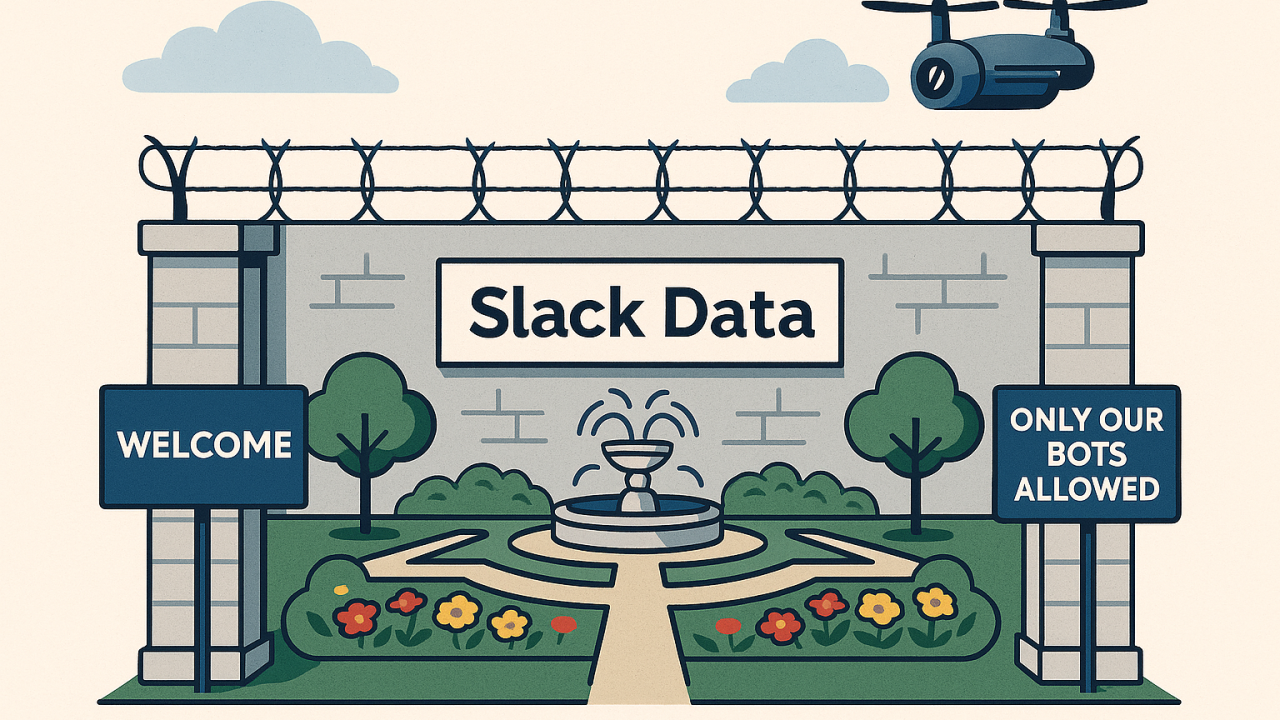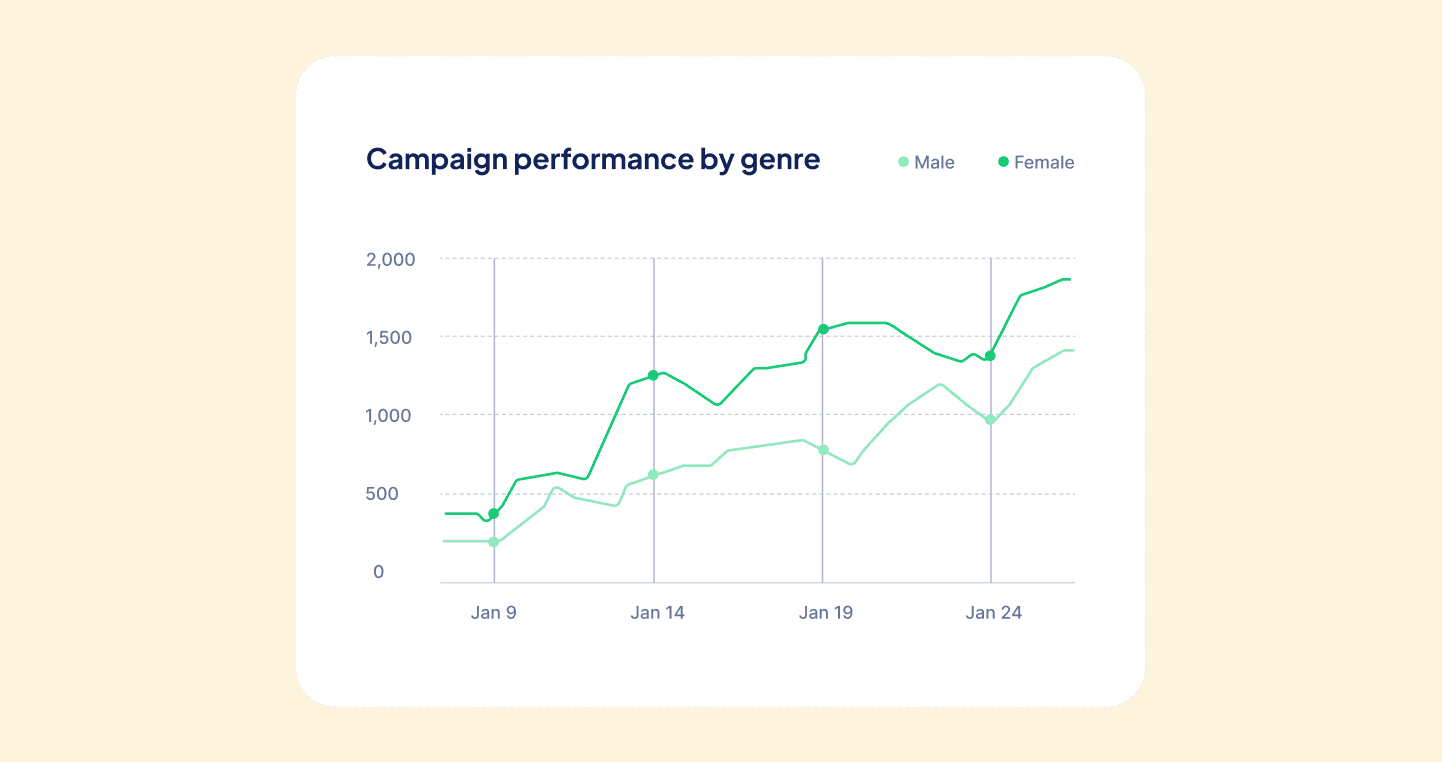Salesforce Blocks AI Rivals from Slack Data: Protecting Privacy or Just Cornering the Market?
Salesforce just pulled the plug on third-party AI tools accessing Slack data. They’re not calling it a data lockdown. They’re calling it “responsible AI.”

Oh Look, Salesforce Is Saving Us from Ourselves 🙄
Salesforce just pulled the plug on third-party AI tools accessing Slack data.
They’re not calling it a data lockdown. They’re calling it “responsible AI.”
In a move that’s got more spin than a Peloton class, they updated Slack’s terms of service to block rivals like Glean from indexing or storing Slack messages through API.
And of course—it’s all in the name of protecting customer data.
Sure. And my VPN is protecting me from baking cookies wrong.
The Real Story: Owning the AI Stack 🎯
Let’s drop the corporate poetry. This isn’t about compliance. It’s about control.
Salesforce doesn’t just want to manage your CRM. Or your customer journey. Or your productivity suite.
They want to own the entire AI loop:
- The data (Slack)
- The platform (Salesforce AI Cloud)
- The UX (Slack interface)
- The insights (coming soon… for an extra fee!)
If you plug Glean, Writer, or any non-Salesforce AI into Slack, they lose visibility—and money. So they banned it.
In corporate speak: “We’re protecting you.” In real speak: “We don’t want you using someone else’s AI that’s better than ours.”
The Problem: Your Data, Their Rules 🔒
Let’s be crystal clear: Salesforce is saying you can’t use your own messages, in your own workspace, with your preferred AI tooling—because it makes them uncomfortable.
Data sovereignty? Apparently not if it interferes with Salesforce’s Q3 roadmap.
Here’s what this move does:
- Kills interoperability
- Stifles innovation
- Creates deeper vendor lock-in
- Makes your IT and AI teams way less effective
You paid for Slack. You wrote the messages. But guess what? You can’t use that data how you want. Because it’s behind Salesforce’s velvet rope.
Salesforce’s Defense (Because We’re Fair 🧑⚖️)
To be fair, they have a few good points:
- Third-party AIs can mishandle sensitive Slack data.
- Enterprises want stronger privacy guarantees.
- Not all AI vendors are equally secure.
But here’s the thing: You don’t need a nuclear option to solve those problems. You need smart policies, permissions, and governance—not a blanket API ban that handcuffs customers.
And if Salesforce can’t compete with other AIs… maybe they should build better tools?
What You Should Be Asking 👇
- If this is about “security,” why is their AI still allowed full access?
- Why can’t you opt in to trusted third-party tools?
- Why is “customer control” always the first thing to go?
- Who gets to decide which AI is safe enough—your security team, or Marc Benioff?
What Likeable Would Do Differently
We’re not in the business of gatekeeping your data. We’re in the business of making AI useful, flexible, and enterprise-safe.
Here’s how we’d approach this:
- Bring Your Own AI: You pick the tools. We wrap them with governance.
- Slack-friendly agents: Modular agents that play nice with Slack and your data standards.
- Audit everything: Track who accesses what and when—without locking you into one vendor.
- Exit strategy included: Data architecture built to port—not imprison.
Final Word
Salesforce wants to make your AI future look like your CRM past: locked, licensed, and limited.
They’re not afraid of rogue bots. They’re afraid of better bots.
You deserve AI that plays well with others—and lets you make the decisions.
Don’t let your data become someone else’s moat.
Likeable.
Emphasize your product's unique features or benefits to differentiate it from competitors
In nec dictum adipiscing pharetra enim etiam scelerisque dolor purus ipsum egestas cursus vulputate arcu egestas ut eu sed mollis consectetur mattis pharetra curabitur et maecenas in mattis fames consectetur ipsum quis risus mauris aliquam ornare nisl purus at ipsum nulla accumsan consectetur vestibulum suspendisse aliquam condimentum scelerisque lacinia pellentesque vestibulum condimentum turpis ligula pharetra dictum sapien facilisis sapien at sagittis et cursus congue.
- Pharetra curabitur et maecenas in mattis fames consectetur ipsum quis risus.
- Justo urna nisi auctor consequat consectetur dolor lectus blandit.
- Eget egestas volutpat lacinia vestibulum vitae mattis hendrerit.
- Ornare elit odio tellus orci bibendum dictum id sem congue enim amet diam.
Incorporate statistics or specific numbers to highlight the effectiveness or popularity of your offering
Convallis pellentesque ullamcorper sapien sed tristique fermentum proin amet quam tincidunt feugiat vitae neque quisque odio ut pellentesque ac mauris eget lectus. Pretium arcu turpis lacus sapien sit at eu sapien duis magna nunc nibh nam non ut nibh ultrices ultrices elementum egestas enim nisl sed cursus pellentesque sit dignissim enim euismod sit et convallis sed pelis viverra quam at nisl sit pharetra enim nisl nec vestibulum posuere in volutpat sed blandit neque risus.

Use time-sensitive language to encourage immediate action, such as "Limited Time Offer
Feugiat vitae neque quisque odio ut pellentesque ac mauris eget lectus. Pretium arcu turpis lacus sapien sit at eu sapien duis magna nunc nibh nam non ut nibh ultrices ultrices elementum egestas enim nisl sed cursus pellentesque sit dignissim enim euismod sit et convallis sed pelis viverra quam at nisl sit pharetra enim nisl nec vestibulum posuere in volutpat sed blandit neque risus.
- Pharetra curabitur et maecenas in mattis fames consectetur ipsum quis risus.
- Justo urna nisi auctor consequat consectetur dolor lectus blandit.
- Eget egestas volutpat lacinia vestibulum vitae mattis hendrerit.
- Ornare elit odio tellus orci bibendum dictum id sem congue enim amet diam.
Address customer pain points directly by showing how your product solves their problems
Feugiat vitae neque quisque odio ut pellentesque ac mauris eget lectus. Pretium arcu turpis lacus sapien sit at eu sapien duis magna nunc nibh nam non ut nibh ultrices ultrices elementum egestas enim nisl sed cursus pellentesque sit dignissim enim euismod sit et convallis sed pelis viverra quam at nisl sit pharetra enim nisl nec vestibulum posuere in volutpat sed blandit neque risus.
Vel etiam vel amet aenean eget in habitasse nunc duis tellus sem turpis risus aliquam ac volutpat tellus eu faucibus ullamcorper.
Tailor titles to your ideal customer segment using phrases like "Designed for Busy Professionals
Sed pretium id nibh id sit felis vitae volutpat volutpat adipiscing at sodales neque lectus mi phasellus commodo at elit suspendisse ornare faucibus lectus purus viverra in nec aliquet commodo et sed sed nisi tempor mi pellentesque arcu viverra pretium duis enim vulputate dignissim etiam ultrices vitae neque urna proin nibh diam turpis augue lacus.
